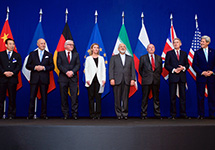December 2, 2015

Negotiations about Iranian Nuclear Program – the Ministers of Foreign Affairs and Other Officials of the P5+1 and Ministers of Foreign Affairs of Iran and EU in Lausanne (Src: Wikimedia Commons)
A report released today by the International Atomic Energy Agency (IAEA) assesses that Iran explored multiple activities related to the development of nuclear weapons in a coordinated program that ended in 2003. The Agency concluded, however, that these activities “did not advance beyond feasibility and scientific studies, and the acquisition of certain relevant technical competences and capabilities.” Although the IAEA also found Tehran had conducted certain studies on modeling a nuclear explosive device in subsequent years, those activities appeared to no longer have been a part of a coordinated program. The IAEA further declared that it had found “no credible indications of activities in Iran relevant to the development of a nuclear explosive device after 2009.”
The report appears to confirm previous findings, published by the IAEA in November 2011. The Agency’s Board of Governors will discuss the new report at its next meeting, expected to take place by December 15, 2015.
Experts from the James Martin Center for Nonproliferation Studies (CNS) and the Vienna Center for Disarmament and Non-Proliferation (VCDNP) are available for comment.
In addition, in partnership with the Nuclear Threat Initiative, CNS has produced various resources for journalists and broadcasters, including high-resolution b-roll footage, 3D video tours, maps, infographics, and more.
CNS Experts Available for Comment
Ms. Laura Rockwood, Esq., VCDNP Executive Director and former chief counsel at the International Atomic Energy Agency focusing on the negotiation, interpretation, and implementation of IAEA safeguards. [email protected]
Dr. William Potter, CNS Founding Director, with particular expertise on the Nonproliferation Treaty, the Middle East WMD Free Zone, and the politics of the Non-Aligned Movement. [email protected]
Dr. Jeffrey Lewis, East Asia Nonproliferation Program Director, frequent commentator on Iran, open source analysis, and other nonproliferation issues for foreignpolicy.com. [email protected]; @ArmsControlWonk
Mr. Leonard Spector, CNS Washington Office Executive Director and former senior National Nuclear Security Administration official, has analyzed measures to address Iran’s past and possible future illicit nuclear and missile procurement activities. [email protected]
Dr. Avner Cohen, Senior Fellow and Professor of Nonproliferation Studies at the Middlebury Institute of International Studies at Monterey, author of Israel and the Bomb and The Worst Kept Secret: Israel’s Bargain with the Bomb, is a widely acclaimed expert on the Israeli nuclear program and nonproliferation issues in the Middle East. [email protected]; @avnercohen123
Dr. Chen Kane, Acting Director of the Middle East Nonproliferation Program, is the former director of external relations for the Israeli Atomic Energy Commission and recent author of the CNS Occasional Paper, “Planning Ahead: A Blueprint to Negotiate and Implement a Weapon-of-Mass-Destruction-Free Zone in the Middle East.” [email protected]; @ACRSME
Dr. Ferenc Dalnoki-Veress, Scientist-in-Residence, can offer a detailed breakdown of the physics behind the deal and the verification mechanisms it includes. He is the primary content provider for the website iranfactfile.org. [email protected]; @ferencdv
CNS-NTI Media Resources
- High-resolution B-roll footage of Iran’s key nuclear facilities and centrifuges.
- 3D Centrifuge Models demystify how the machines work.
- Iran Country Profile provides an in-depth look at Iran’s nuclear program, replete with comprehensive chronology of the program’s milestones.
- Iran WMD Map, detailing where the most sensitive nuclear, missile, and other facilities are located.
- 3D facility videos and updates on Natanz, Fordow, Bushehr, and Arak nuclear facilities, as well as the Imam Khomeini Space Center
- Jeffrey Lewis, “Visualizing Centrifuge Limits Under the Iran Deal”
